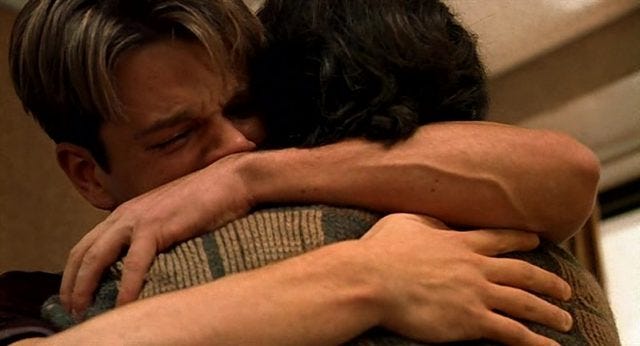For a long time, I’ve used blocking as a way to protect myself from deep emotional anguish. It may take a lot for me to make the move, but if you hurt me badly enough, with just a few clicks of my phone, I can cut you out of my life forever.
Not everyone is a blocker — and good for them. Maybe they’ve never experienced the type of suffering that triggers one to make such a serious call, or maybe it’s easy enough for them to place a mental block on a person instead of a literal one. But no, that couldn’t be me. That isn’t harsh or final enough. Knowing me is a privilege, and I decide who gets to stay.
As Robin Williams’ character softly says in Good Will Hunting, “We get to choose who we let into our weird little worlds.” And I would add, we also get to choose who we kick out of them.
So here are a few situations I have found myself needing to block someone. Why don’t you tell me if you would have done the same?
1. The Disrespectful Friendship
The slow disintegration of this connection led me to block her — not because it felt like the best solution, but because it was the only way to prevent myself from giving more to someone who no longer seemed to care. It felt like the only way to say "no" to a situation where I felt powerless. Yet, each time I tap that bright red button, I wonder if it makes me weak or immature. Not everyone resorts to blocking when hurt, so why do I? Is it a reflection of the people who hurt me, or of me?
Blocking my friend felt like the only option left, as every interaction caused me so much pain. After over a decade of close friendship, all that remained were empty exchanges, and her insincere interest deepened the widening gap between us. When I mentioned how strange things felt, she replied, “I’m sorry you feel that way.” I needed sincerity, but instead, I felt more alone each time we spoke.
When I blocked her, I hoped it would bring closure, but even now, I find myself questioning whether it was the best way to handle the situation. Although I recognized that the relationship had deteriorated, I still contemplated whether completely shutting the door was necessary or even the right choice.
2. The Toxic Ex-Romantic Partner
Blocking wasn’t always used to protect myself. My first experience with it came from a toxic, on-again, off-again relationship in my early twenties, where it was more a tool for terror and avoidance than self-preservation. Back then, romantic love was associated with intensity and drama. Whenever one of us hurt the other, we’d take turns blocking each other, only to find ways to bypass it — dialing *67 to show up as "Unknown Caller," sending a barrage of emails, or showing up at each other’s front doors with pathetic bouquets and handwritten apologies. At the time, it felt romantic — our way of showing we cared and would never give up on each other. Of course, that relationship ended in fiery flames, and the block remained, permanent and final.
3. Difficult Family Dilemmas
The need to protect my emotional well-being extended beyond my platonic and romantic relationships; it also influenced my decisions regarding family. I muted my brother before he died because our interactions were full of frustration and pain. It wasn’t him reaching out — it was his alcoholism, a painful reminder that, long before he passed away, I had already lost him. I regret not answering his messages before he died, but I now understand that my actions reflected my inability to cope with his struggle.
This need for emotional safety continued with my father, whose behavior also led me to make a tough decision. I blocked him after he sent me cruel, threatening text messages about other family members. I didn’t speak to him again until the year before he died. I chose to reopen the dialogue because he was sick, and I took pity on him. I don’t regret blocking him all those years, but I wish I had shown more compassion during his final months. Instead, I left many of his messages unanswered.
While blocking or muting them felt like the right choice at the time, it left me questioning whether more emotional understanding could have been possible in their final days. I will never know, but the pain of their loss is a reminder that sometimes, in our efforts to shield ourselves from hurt, we sometimes avoid the very healing we need.
Blocking is permanent; it cauterizes the wound, making it a difficult but necessary step toward healing. It’s a way to regain control when someone has taken it away and serves as reassurance that everything will be okay after someone leaves you clutching the left side of your chest in woeful agony.
While I’ve rarely regretted blocking someone, I have muted or cut off a few people who later passed away, which made me question if this is always the healthiest way to deal with my hurt.
I’ve come to understand that it is completely situational and entirely up to you whether you choose to untether yourself from another human being by blocking them. It’s a necessary and useful tool for me — lest a rope forever bind me to those who cause immense suffering.
What would it take for you to block someone?






I've blocked coworkers just so they couldn't find me and snoop.
Thanks for sharing your thoughts on this. I can relate to the need to set boundaries.
Loved your words, Lindsey. I'm not tech-savvy enough to block someone or know if I've been blocked : ) Ignored my sister for about 25 years (drugs), but then reconciled for her last 20 years of life. Stopped responding to my best friend's emails when they became toxic (mental illness); received a letter from his nephew that he died. Never completely shut them out of my life because I always remembered the good times.